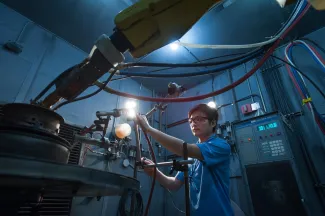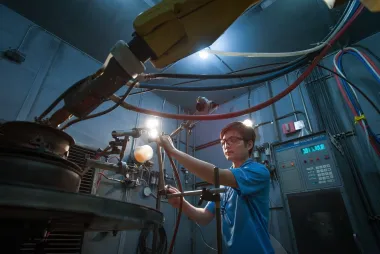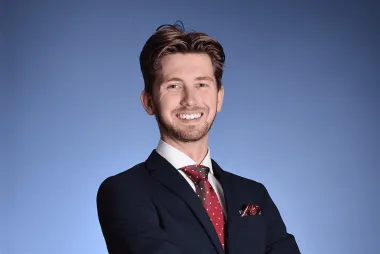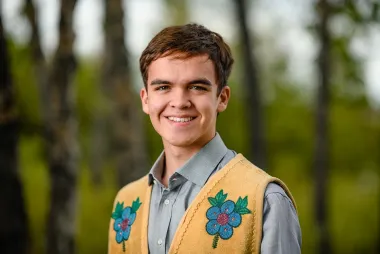"Take the opportunity to try new things and explore the interface between different fields. As you broaden your knowledge, you may find questions that no one has asked and answers that could make an impact on society."
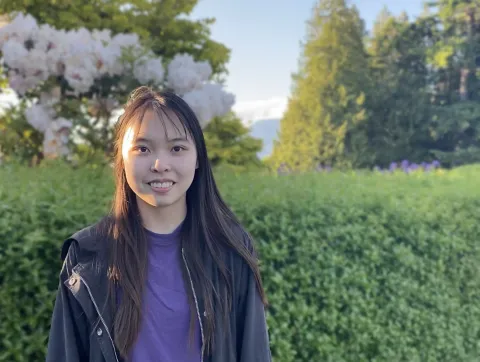
Betty Cai
- Degree: Bachelor of Applied Science
- Grad year: 2021
- Program:
- Campus: Vancouver
My name is Betty and I am a graduating student in the UBC Materials Engineering program. My path to university began in 2015 when I entered the University Transition Program, an accelerated program at UBC that condenses five years of high school into two years. Through this program, I graduated high school at the age of 14 and began my studies at UBC Engineering. During my time at UBC, I have been able to participate in a wide range of amazing opportunities. From designing satellites to developing materials for wearable devices, my experience at UBC Engineering has allowed me to expand my knowledge while applying my skills towards a variety of real-world problems.
Why did you choose to go into your field of study at UBC?
I have always had a passion for math and science. I did not consider engineering as a career, however, until I entered the Transition Program. I was inspired to pursue engineering in university by Dr. Ludmila Shepelev, my math and physics teacher who is also an engineer herself. Through our conversations, I became fascinated with what a path in engineering had to offer. I found that engineering was the perfect choice for me, as it combined my passion for math and science with my love for problem-solving. Another experience that reinforced my decision to join UBC Engineering was ‘campus days’, an event in which we would spend a few days on campus to sit in on any courses we were interested in. Sitting in on the first-year engineering courses, I found myself interested in the material that was being taught and felt a sense of belonging that I didn’t get with other disciplines. With that, I was confident that UBC Engineering was the right place for me to pursue my degree.
What has made your time at UBC memorable?
Over the past four years, I have had so many experiences that have made my time here truly phenomenal. Among these experiences, my involvement in research has been the most significant, as it was really a process of figuring out what I wanted to do with my career. My research experiences are memorable not only because of the skills I have gained or the insights they have provided. More importantly, I am so grateful to have been able to learn from amazing mentors and build friendships that I will cherish for a lifetime.
My time at UBC has also been made memorable by the amazing projects I was able to work on. In my first and second years, I was involved in the Structural sub-team of UBC Orbit, where I designed the structure of a small satellite for early forest fire detection. In my Capstone course, I had the chance to work on an equally fascinating project with Canadian Nuclear Laboratories, designing test setups for nuclear fuel claddings to investigate their material behaviour. These experiences have allowed me to expand my knowledge and apply my skills towards industrially relevant problems, all while making new friends in the process.
Tell us about your experience in your program. What have you learned that is most valuable?
Going into MTRL, I was already excited about what materials engineering had to offer. My time in MTRL, however, has allowed me to transform this excitement into passion. In the MTRL program, I was able to learn from professors who are dedicated to their teaching and truly care for their students. Through the breadth of courses, I was able to build the foundation necessary to pursue a career in any area I wished.
Beyond technical knowledge, the most important thing I learned from my time in MTRL is how to communicate effectively with a wide range of audiences. Over the past three years, I have taken several courses focused on different aspects of technical communication — different forms of writing, presenting, negotiating, and corresponding with professors, colleagues, and employers. These courses have given me a framework of thinking that I use every day when communicating with others from different backgrounds. Although I didn’t expect to learn so much about communication as an engineering student, I am glad that I did, as it is perhaps the most important aspect of succeeding as an engineer and as a professional.
How are you applying the skills you learned through your studies at UBC?
I am always looking for opportunities to apply the skills I have learned to give back to my community. Over the past year, I have been working with Dr. Gabrielle Lam to develop lab content and case studies for APSC 278/279, Engineering Materials courses taken by nearly 700 students each year. This experience has allowed me to improve the learning experience of future students while advancing my knowledge of materials engineering.
As my next step, I plan to build upon the knowledge I have gained at UBC by pursuing a PhD in Materials Science and Engineering at Stanford University. I will be performing research in the field of biomaterials, applying my skills and knowledge to develop materials that integrate seamlessly with the human body. Through my work, I hope to enable the use of biomaterials in therapies to improve people’s lives.
How do you feel your degree has benefitted you compared to a different field of study?
Engineering is based on the theoretical yet focused on application; because of this, it has the unique ability to make an impact on the world around us. Materials engineering is especially exciting to me due to its importance to so many aspects of society, from renewable energy and transportation to infrastructure and human health. A more fundamental field may only involve investigating patterns in nature, whereas a more practical one may only be concerned with applying our knowledge towards different areas of technology. For me, materials engineering is a perfect mix of the theoretical and practical, opening the door to a wide range of opportunities.
What advice would you give a student entering your degree program?
Innovation requires a diverse knowledge base. During your degree, take the opportunity to try new things and explore the interface between different fields. As you broaden your knowledge, you may find questions that no one has asked and answers that could make an impact on society.
Where do you find your inspiration for using your degree to make an impact on our world?
I am inspired by my family, friends, and professors whose advice and perspectives have guided me throughout my degree. I have been fortunate to learn from wonderful role models, including Dr. Tao Huan, Dr. Gabrielle Lam, Dr. John Madden, and Dr. Berend Wassink, whom I can always count on for inspiration and support. My family and friends are also a major source of inspiration, always coming up with new ideas that I would have never thought of myself.
What are your future plans to make a difference in our world?
My goal is to shape a world where innovative medical treatments are available to people who need them, no matter who or where they are. To achieve this goal, we must engineer materials that communicate and connect with the human body and apply them in therapies to restore human function. By developing more reliable and cost-effective therapies, I hope to contribute towards solving complex problems in human health and improve the quality of life of those affected by disease.
